
Jasper Johns
“Experience teaches us that even when one hears the doorbell ring it is because there is never anyone there.”
Eugene Ionesco (The Bald Soprano)
“Verily, it is easier for a camel to pass through the eye of a needle than for a scientific man to pass through a door.”
Walter Benjamin (Letter to Gerhard Scholem, 1938)
“That which is not manifest is much more vast than that which is manifest. The invisible is greater than the visible. So it is also for language…. Only because language casts a shadow both much vaster than itself, and inaccessible, does the spoken word hold and renew such magic.”
Roberto Calasso (Baudelaire)
There is a new film version of King Lear due out. I saw the trailers, which is all one needs to see, really. Anthony Hopkins is the driving force behind this latest infantilization of Shakespeare. And this reminded me back in the mid seventies, in L.A., when I saw Hopkins at the Huntington Hartford Theatre in a production of Equuas. He may have also directed it, I can’t recall. But he took over (I think) the role of the psychiatrist from Brian Bedford. I was besotted with a girl who worked at the Hartford switchboard and so I got to sneak in and stand in the wings and watch the show. I saw both actors in the role of Dr. Martin Dysart, a number of times. And what struck me was that Bedford was the more lacerating performance. The deeper performance. Now this is a play (by Peter Schaffer) that is a kind of bourgeois “serious” play. It is what American audiences think of as meaningful theatre. Its not horrible by any means. Its clever and facile and rather effective for what it is. But the point is that Hopkins made the play about the boy. Bedford made it about the shrink. And thereby made it more personal, more intimate and unsettling. And it strikes me that this is always what Hopkins does, in a sense. He is a very good actor, but he is not a great actor. Bedford became a staple on Broadway I think, but the point is that Hopkins is much more renowned name, now, than Bedford. And so, watching the trailer for this new Lear (directed by Richard Eyre) it was hard not to see that distance at work in even brief clips. Not to mention the ‘concept’ of this Lear. I relate all this as a sort of segue into watching the public spectacle of “mourning” for John McCain. (perhaps the psychotic and sadistic act of blinding six horses with a spike by a disturbed young stable boy just naturally leads one to think of McCain). This was one of those moments in which a kind of clarity emerges out of the kitsch grief coming from celebrities and politicians and their small performances of official beatification. Not just a war criminal, McCain, but a craven mendacious sadistic serial liar, misogynistic, racist, ruling class authoritarian — and one tailor made for liberal America. It is possible McCain never did a single good thing in his political life. He certainly did nothing in his military life that was not reprehensible. He carried out a dozen bombing raids over Vietnam that killed no doubt thousands of a people he referred to, until his death, as “gooks”.
So it is worth looking at why McCain elicits such exaggerated outsize adoration. At the funeral service one found the dynastic families of Empire, the Bushes, Clintons, Obamas, and even the gnarled form of Henry Kissinger showed up. One also heard from Joe Lieberman, and that other Joe, Biden, as well as McCains strangely surreal daughter Meghan. McCain once called his wife a painted trollop and a cunt, in public, but seemed to suffer no publicity deficit because of it.
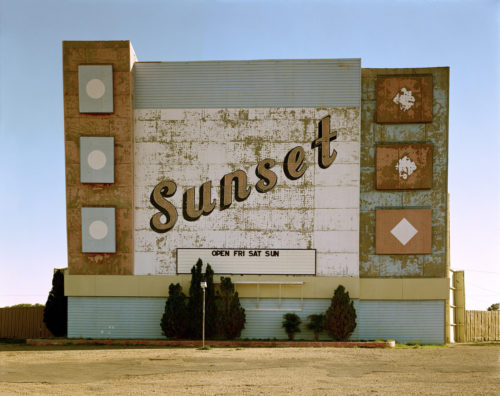
Stephen Shore, photography (Texas, 1974)
Michael Woods recounts….“Cliff Schecter, in his book The Real McCain, broke the story, and I tracked him down to shed some light on McCain’s despicable conduct, which was witnessed by three reporters in Arizona. McCain, then 56, was on the campaign trail with his second wife, Cindy. As Schecter recounts, Cindy was standing with her hubby, and two McCain aides. She twirled his hair and said, “You’re getting a little thin up there. “ McCain blushed, and responded with a level of vehemence that any fence sitter pondering voting for a man who seems to view wars as his version of Viagra has to see as simply scary: “At least I don’t plaster on the makeup like a trollop, you cunt.” Three reporters, Schecter says, were present for this disgusting display.”
Its curious that when George McGovern died, in 2012, there was an almost complete media silence. Like McCain, McGovern lost a presidential race. But he was against war and McCain (and Obama and Bush and Clinton) are FOR war — and anti war — well, that is not the image that gains traction in the USA. McCain is, er, was a member of the World Anti Communist League, a far right openly fascist organization that is in line with the U.S. and McCain’s support for the putsch in Ukraine (courtesy of the CIA, Victoria Nuland and Hillary Clinton) that put not a ‘neo nazi’ party power, but a full on NAZI PARTY in power. One replete with swastikas and sieg heil salutes.
And it should be noted that his support for this Nazi party included personal visits and a lot of lobbying around D.C.

Catherine Murray
McCain’s Washington office, in fact, was referred to as the defense industry ‘club house’. No, this was not just your average pro-American corrupt politician, but a deeply committed believer in war and death. In fact, McCain, it would seem from all evidence, had a hard time evaluating the world around him in any terms other than war.
During the Imperium’s state service for the ‘maverick’ the camera caught George Bush sneaking a cough drop to Michelle Obama. I say the camera caught…but really this was utterly choreographed. Such arch moments of ‘cute’ are the staple of rehabilitative image control. But I was also remembering David Foster Wallace’s valentine to McCain in Rolling Stone (when he covered the Straight Talk Express). Chris Welzenbach had a nice piece here:
Imagine a Bernhard or Pinter, a Lorca or even Hemingway, Faulkner, or Sartre, being so mindlessly intoxicated with a proximity to power. “McCain was a cool guy” gushes DFW. Such a piece of fluff suggests just how far removed Wallace was from the real world. How entitled, how white, how affluent. I have defended DFW a bit in the past, I think mostly because of his very funny essay A Supposedly Fun Thing I Will Never Do Again. But then, while it IS funny, so is the writing of Carl Reiner or a dozen other comedy hacks. And Reiner is actually much funnier on the whole but I don’t indulge him 1600 page post modern novels. But my point is that the MFA era of arts and letters in the West is one in which a certain naivety is required. *Agism*, I am finding, is not because of a cultic worship of youth, but rather a fear of the seriousness of age.
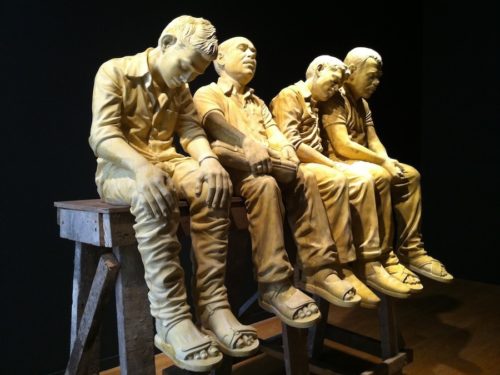
Jitish Khalet
“..our sense of a seemingly irreversible tendency (and you’ll notice the iteration of seeming in all thatI’ve been saying) toward the end of mimesis by default, or as if in the new reality on the computer, mimesis is not the default. With the displacement of bodily gesture and desire into electronic commands, and the miniaturization of an exhaustive memory that is not, like the Freudian unconscious, a scene of representation, the scene of the world is increasingly dematerialized, and in another kind of culinary theater, divested by swift bytes of all that used to fill it.”
Herbert Blau (Reality Principles)
The lost scene of representation is linked to the crumbling ability to narrate. To narrate anything. Somewhere Blau wrote …“The past needs blood donors. The theater is a means of transfusion.” And yet today it is not. The audience is not listening. Not only is it not there, it is also not hearing what is said. Like Mrs Smith in The Bald Soprano arguing about that doorbell. It is Lacan’s missed appointment.
It is hard to imagine, in one sense, what a great play would look like today. The last great playwrights, in the West, have been Pinter, Bernhard, and Handke. And perhaps Heiner Muller. Perhaps. Shepard and Mednick are worthy artists and it is maybe too early to tell. Who else? But that’s not a real question because the question is about the missing audience. And a society in which this growing inability to narrate ourselves is resulting in what Jean Baudrillard once called “that spongy referent” (per Blau). The trend away from text-privileged theatre only means theatre is being replaced by spectacle. For text is the bedrock of theatre, it is what theatre comes out of…that and the elusive scene of representation. And here Lacan was right, too, about that scene. The empty stage in our psyche. And I continue to suspect that the resiliency of Kafka has to do with his creation of space. Kafka’s narratives unfold on an empty stage — no matter what the set is. It is, of course, also a dream space.
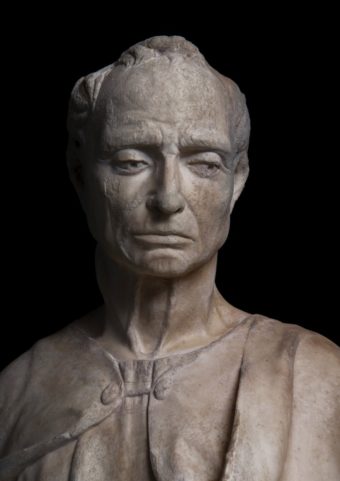
Donotello (Prophet, Opera di Santa Maria del Fiore)
“The long and the short of it is that apparently an appeal had to be made to the forces of this tradition if an individual (by the name of Franz Kafka) was to be confronted with that reality of ours which realizes itself theoretically, for example, in modem physics, and practically in the technology of modem warfare. What I mean to say is that this reality can virtually no longer be experienced by an individual, and that Kafka’s world, frequently of such playfulness and interlaced with angels, is the exact complement of his era which is preparing to do away with the inhabitants of this planet on a considerable scale. The experience which corresponds to that of Kafka, the private individual, will probably not become accessible to the masses until such time as they are being done away with.”
Walter Benjamin (Notes on Kafka)
For this is also resonant with the famous opening lines of Hamlet…“who’s there?”
Lines spoken by the wrong character, as Blau liked to point out. The approaching figure speaks those lines. The audience today, whether for TV or theatre or sporting events is one without qualities. For it is so stripped of any capacity to recognize itself as audience. The idea of collectivity has been irreparably damaged …at least in the West. And today, the presentation of classic texts (sic), such as one sees in all recent Hollywood Shakespeares, is insistent on childishness. It is unserious before it is anything else. And it is, then, secondly, mock serious. I was thinking of Bresson this week, and in particular the late colour Bressons. Films such as The Devil Probably seem alien and incomprehensible. How to begin explaining the beauty and brilliance of that film to the average filmgoer today?
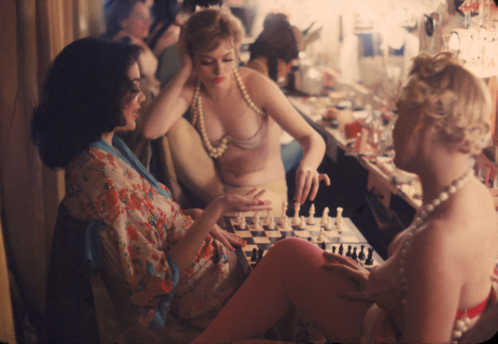
Gordon Parks, photography. (Showgirls playing chess, 1958)
“As for death, whatever it is, as we’ve come to say in theory, it can’t be represented, yet can only be represented. This is something that Beckett, whose shorter plays in particular would appear to be models of fragmentation in dispersion of the subject, really understood, the haunting tenacity of the mimetic, even when, as in Breath, there is no performer at all, or in Not I, nothing but a Mouth, and torrentially, unstoppable, those words, words, words—what the nonmimetic theater, or the illusion of such a conception, has also tried to do without.”
Herbert Blau (Reality Principles)
Text, words — words spoken out loud. Words memorized (!) and rehearsed. Learned from *memory*. Today the speech meant to be listened to by an audience is the province, officially, of elected officials. Not even celebrities really speak out loud. So the service for John McCain was state theatre. And the unctuous and idiotic cliche ridden pap of war criminals and their aides are tossed into the air without context, without any intention at narrative coherence or meaning. It is Dada. And it denies, at every moment, that vast inaccessible shadow that Calasso noted about language itself. Obama said he was never doubt that he and McCain were on the same side. THAT was the only true thing said. But the text is the foundation of mimesis, paradoxically. At least on stage. Any stage. And in the digital age the loss of the mimetic (as I repeat endlessly, I guess) is significant in the rise of fascism once again.
What Blau called the ‘non mimetic theatre’ is that which is, as in Robert Wilson, something which attempts a kind of micro management of image, an authoritarian notion of control, and ends up simply emotionally rigid and intellectually stultifying, and in subtler ways politically reactionary. When I write that I can almost here the complaints. In fact discussing politics at all makes one, essentially, persona non grata in the arts in the America today. For what passes for political theatre in America is only identity politics drawn in broad strokes. In simplistic crayon renderings of one dimension.

Ed Clark
“As for alternatives to the text, in this serial, cyclical, and solipsistic time, it also seems—when all that was formerly said is done, voiced, in ideographs of self-reflexive sound—that we move off the page to realize (again) that, at least for us, the oral tradition is written and the performer’s body inscribed. Anybody who has been around actors’ improvisations will know what I mean. The aleatoric spontaneity is a repertoire of cliché, in the body, in the voice, in the whole carnal stereophony…”
Herbert Blau (The Dubious Spectacle)
Understanding this about theatre, about text, is significant not least because it is so utterly ignored today. Theatre is always about some sort of revelation. Things happen in a heightened state of awareness and that comes out of actors losing themselves to the character (more on that later) and the play — meaning the text. And that the body, the sensual primordial presence of theatre is only there if there is a text.
“Instead, it involved a cult, closely bound up with texts of extreme complexity, and an intoxicating plant. A state of awareness became the pivot around which turned thousands and thousands of meticulously codified ritual acts. A mythology, as well as the boldest speculation, arose out of the fateful and dramatic encounter between a liturgy and rapture.”
Roberto Calasso (Ardor)
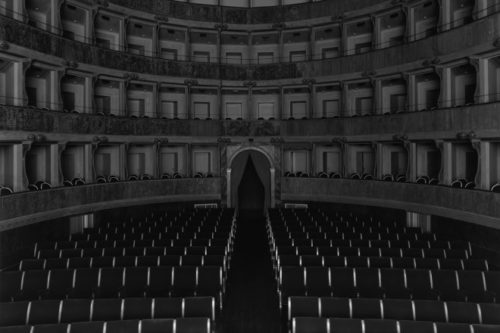
Hiroshi Sugimoto, photography.
Those mysterious Vedic peoples that Calasso is so rightly obsessed with were in fact the precursors to all theatre. Theatre is not born of religious practice, but rather the other way round. Theatre is that which is a logical extension of our psychic formation. Theatre is always psychoanalytic in that sense.
“The spectacle is the existing order’s uninterrupted discourse about itself, its laudatory monologue.”
Guy Debord (Society of the Spectacle)
There is a deep distrust of the intellectual in America. There always has been. In Europe, today, that distrust (which is much less acute and all encompassing) is expressed through the Calvinist or Luthern notion of not being pushy — in other words it is false modesty as paranoia. In Scandinavia I find that expressing an idea often is perceived as being pushy and rude. But in other places, Germany today, and Austria and Switzerland, there is an absolute new fascist sensibility on the rise. In the U.S. the new fascism is being *handled* (the way Madison Ave or just Hollywood agents handle their client’s careers) by the bourgeois liberal. White people, educated white people, most often liberal, have taken a kind of refuge in helping manage perception. I mention this because the erasure of theatre (and art, overall) is being replaced by a kind of lay professionalism — unpaid professionalism if you like — in the masses who like to project directorial aspirations onto their iPad or lap top or whatever. And I suspect this has something to do with the popularity of Reality TV. The viewer (not the audience) imagines how to direct this scene before them. Everything then begins to feel like a rehearsal.
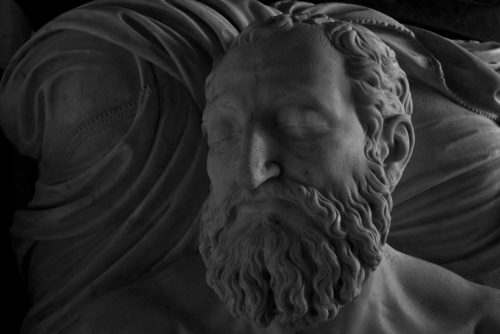
Jean Christophe Ballot, photography.
“In the beginning there was a mute king, Māthava of Videha, who kept in his mouth the fire called Agni Vaiśvānara, Agni-of-all-men, that form of Agni which all living beings keep inside themselves. Next to him, a perennial shadow, a brahmin, Gotama, who provoked him, first with his questions that remained unanswered, then with his ritual invocations, to which the king, according to the liturgy, should have answered. And the king still remained silent, for fear of losing the fire he had in his mouth.”
Roberto Calasso (Ardor)
But these private projected rehearsals are silent. It is as if one were directing a silent movie but had no intertitles (title cards). The intertitles had been lost. People spoke but the viewer can not hear them. And it is true, too, that one listens much harder with silent film.
“Kafka listened to tradition, and he who listens hard does not see. The main reason why this listening demands such effort is that only the most indistinct sounds reach the listener.”
Walter Benjamin (Notes on Kafka)
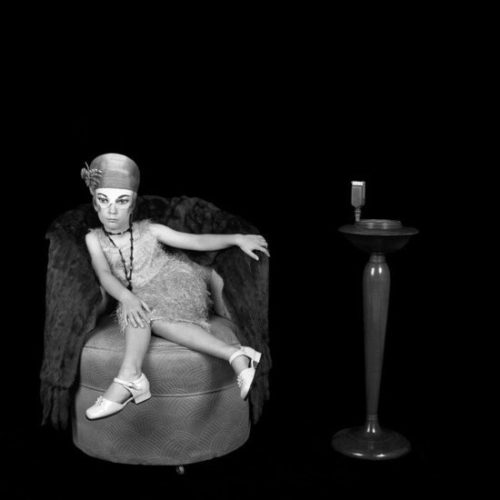
Polixeni Papapetrou, photography.
The great texts of theatre, from the Greeks to Shakespeare, are inscrutable. And that is not something simple. It is not easy to create and it not easy to perform. The contemporary idea of performativity is cheapened beyond description, actually. The rise of performance art, and monologuists, and stand-up comedians, is symptomatic of the lost mimetic, and is also predicated upon a loss of listening. And it is a way to deny the inscrutability of text itself. The monologue is a fascinating paradox in that sense. There are outlier examples of single character plays that manage to not be simply monologues. But for all intents and purposes the stage requires two voices. At least two. And that is because in the scene of representation someone must be really listening. All great actors know that acting is listening.
And one of the problems with Derrida, for example, when writing about theatre, is the belief that intentionality occupies a very rarified place. Intentionality in theatre is accrued, it is accumulative and hence, also, inscrutable to some degree. What an actor intends is never clear, even to himself. Especially to himself. And that is, partly, what rehearsal is for. Not to clarify intention but to render it superfluous. For this spoken text is meant to find itself in a process (per the Vedic priests) between rapture and liturgy. The endless rituals of creating a play, at least if the process is taken seriously, are almost unconscious after a while. One rehearses and rehearses, repetition after repetition, and each step accumulates something of the inaccessible — which remains inaccessible but is now *on stage*. Theatre is like a magnifying glass held over one’s gesture and voice, one’s memory and one’s forgetfulness. And that is another paradox. The actor must, at the moment of performance, forget everything. He cannot be the play, the character, unless he forgets. That is Artaud’s insight. The nakedness of being on stage. You forget but then you remember.
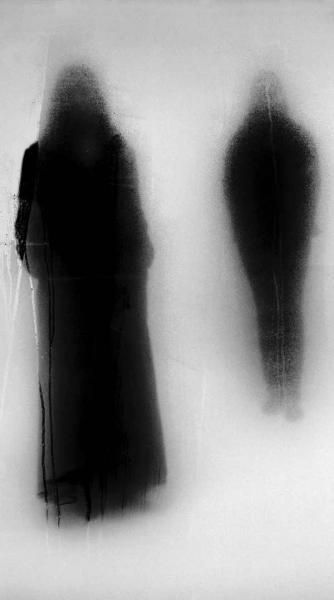
John Batho
Blau made a rather profound observation in relation to a discussion of acting methods and the effects of Lee Strasberg and the Actor’s Studio, and the rise of affectless performance art in reaction to the *method* — where he noted that the conservatism of Reagon’s America found expression in the “tape-looped and tautological, or the repetitive sonorities of Philip Glass— the trickle-down solipsism of a libidinal economy…”. The solipsistic banality of zombie abstraction or much gallery performance and concept art was structurally resonant of the ruling class boot-heel that was planted ever more firmly on the necks of the working class. Art suffocated, as if in police choke holds. And the post modern fetish of surface became solipsism, with the growing narcissism of the culture overall now applauding that which was most without qualities.
The depreciation of tragedy in post modern culture, maybe especially on the left, seems a kind of denial. I mean tragedy is everywhere. But this raises the question of what one means by tragedy. And here Kafka is important again. As is Bernhard, no doubt, and Handke. America has never felt the need for tragedy. America is optimistic. Even the Puritans were optimistic. Sort of. The only American writer who I think is tragic is Melville. One might find a number of poets who were close, maybe. Hart Crane and James Wright and Wallace Stevens…but poetry is a special category. And Melville was tragic because he was immense. By virtue of his cosmic perspective, and his understanding of that vast shadow cast by language itself, Melville was expressing suffering in everything he wrote. And those articles of suffering accumulated.
“Sometime before the days of the Buddha—no one can be quite sure when—there appeared the figure of Yājñavalkya. Sacrifice (yajña) is in his name, but the meaning of -valkya is not so clear. He had received his learning from the Sun, Āditya. To know, one must burn. Otherwise all knowledge is ineffective. One must therefore practice tapas. Tapas means “ardor”—it means the heat within the mind but also cosmic heat. And the Sun is the being that produces heat more than any other. To gain learning, it is natural to turn to him. In the oldest texts, wherever Yājñavalkya appears, he speaks little and speaks last.”
Roberto Calasso (Ardor)
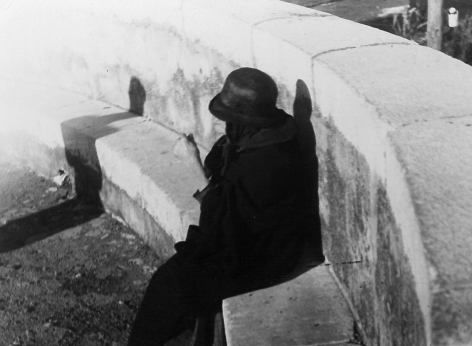
Germain Krull, photography.
In Kafka, everything is a symbol. I believe Calasso said that. But everything he wrote is also a parable. Benjamin said that (more or less). Both statements are true. But Kafka was alone, and his view of the world was more interior that any other writer save perhaps some of the Old Testament writers. And this isolation, of which Kafka owned a preternatural and surgical clarity, fed a precision that allowed for (and fueled) the creation of a landscape that feels both familiar and terrible but undeniable. And perhaps that is a definition of realism. That which is undeniable. When Blau spoke of the Actor’s Studio, he was ambivalent — mostly because he feared (rightly) that the poorer versions of the ‘method’ would entrench themselves in a such a way that *naturalism* would come to mean a very narrow kind of behavioral manner and style (forgetting the original search for emotional truth). Commercials were method acted. And that loss of a search for truth in the Method mirrors what happened to Psychoanalysis when it travelled to the U.S. The radical and politically radical nature of those first Freudians was to become adjustment therapy and Dr. Phil. Just as Brando and George C.Scott were to become Nick Cage and Jim Carrey.
There is another quality in today’s film versions of classics, especially Shakespeare. And that is self congratulation. And King Lear is an enormously difficult play anyway (I once directed — in a limited run sadly, in Lodz Poland, a trilingual Lear with the Polish actor Marian Opania. It was performed in English, Polish, and Norwegian and we had two Lears on stage throughout. I found it a very successful experiment. But I digress. The play is among the most inscrutable of Shakespeare’s works (only Hamlet is more so). It is also the most intensely tragic. It is a kind of dissertation on the tragic. In a strange way I think Pinter had it in mind when he wrote The Homecoming.
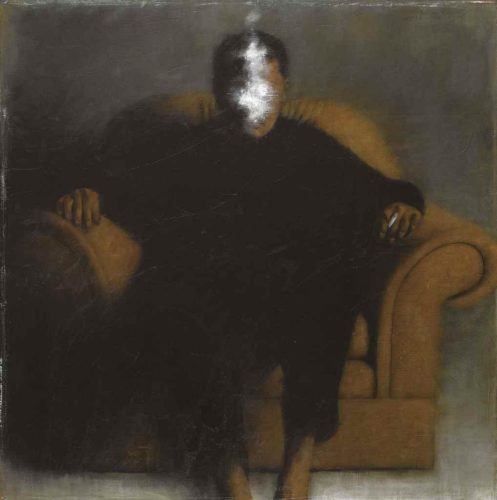
Ahmad Zakii Anwar
The film Dawson City is worth a posting all on its own. For for now, one of the striking things was to see film from the late 19th century in which the people being filmed, on streets or at work, were un-self conscious about being filmed. For they had no idea what that meant. Early experiments showed men and women have trouble identifying themselves in films, or when hearing their voice in a recording. I suspect this is much less true today. It may be the place they recognize themselves the most easily. For it is how they imagine themselves. The western imaginary is now a film strip. And so theatre is now produced and imagined in cinematic terms. And if psychoanalysis is a working through, at least for Freud, theatre too is doing the same thing. Working through without any idea of a destination. Which reminds me of one of Kafka’s mini parables…
“I gave orders for my horse to be brought round from the stables. The servant did not understand me. I myself went to the stable, saddled my horse and mounted. In the distance I heard a bugle call, I asked him what this meant. He knew nothing and had heard nothing. At the gate he stopped me, asking: “Where are you riding to, master?” “I don’t know,” I said, “only away from here, away from here. Always away from here, only by doing so can I reach my destination.” “And so you know your destination?” he asked. “Yes,” I answered, “didn’t I say so? Away-From-Here, that is my destination.” “You have no provisions with you,” he said. “I need none,” I said, “the journey is so long that I must die of hunger if I don’t get anything on the way. No provisions can save me. For it is, fortunately, a truly immense journey.”
There is another even shorter one…
“They were offered the choice between becoming kings or the couriers of kings. The way children would, they all wanted to be couriers. Therefore there are only couriers who hurry about the world, shouting to each other–since there are no kings–messages that have become meaningless. They would like to put an end to this miserable life of theirs but they dare not because of their oaths of service.”
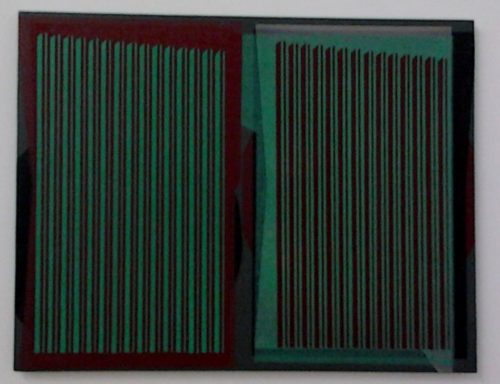
Tim Renshaw
There is no vocabulary for seriousness today. And because of this the serious person is always socially awkward. Critics of the arts are not serious. Try to name some. All of this is obvious. There is nothing left in the western imagination, at the visible level anyway, but scavengers of earlier forms and styles. Mostly styles.
“Pastiche is thus blank parody… With the collapse of the high- modernist ideology of style—what is as unique and unmistakable as your own fingerprints—the producers of culture have nowhere to turn but to the…imitation of dead styles, speech through all the masks and voices stored up in the imaginary museum of a now global culture.”
Frederic Jameson (Postmodernism or the Cultural Logic of Late Capitalism )
And the scavenging must be ironic. Ironic vultures or jackals. And here, by way of wrapping this up, I want to suggest that this infantilized de-narration, these endless repetitions of the most simple and reductive and obedient beliefs and utterances, are serving to reveal more starkly –for those who wish to look — the schizoid and narcissistic character inhabiting advanced capital.
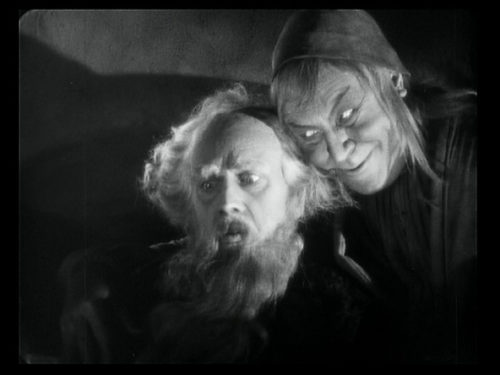
Faust (F.W. Murnau, dr. ) 1926
“Lacan describes the imaginary, accordingly, in terms of a ‘specular ego’ which imitates the look of the other and constructs its imago ‘like another’. Thus from the outset, the imago is not an autonomous creation of the child’s own desire, as the self would subsequently like to believe, but a reified simulation of what the mother desires the child to become.”
Richard Kearney (The Wake of the Imagination)
The jackals that must feed off the other. Decentered and envious, confused, and increasingly mute. Where there are only dispersed words and sentence fragments. Sounds escaped from misplaced pages. And it was Lacan who insisted that the language-structure of the unconscious leads logically (sic) to something quite different than American adaptive psychology, to re-adjustment — which leads to and assists the propaganda machinery of the western capitalism. But rather, if followed, that unconscious structure is a path to a dissolution of the false humanism of the West. The dissolution of the bourgeois pretension of coherence.
Aesthetics has come (and maybe this has been true for a while) to be important only if it is recapturing history and memory, not as style codes, not as imitation under the banner of innovation or newness, but as inscrutable parables of suffering — an endeavor of great effort and cost, but the revolution this time comes as revelation. The revolution has no destination, only and endless rehearsal to make rehearsal superfluous. These are the paradoxes of western madness today. Only the serious matters and only the difficult matters. And what matters least is approval. There is a nice bit of B movie prison noir out…probably seen by few…Shot Caller. And in it a cop is interrogating a man who has become a member of a ruthless and notorious prison gang. The convict says ‘there are your rules and there are their rules…and theirs matter’.
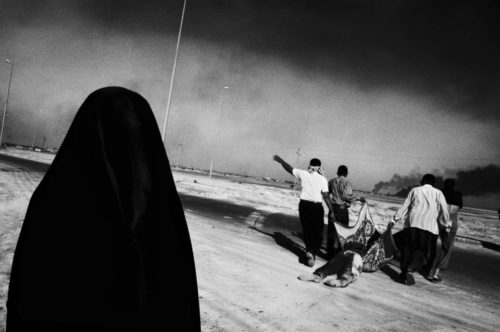
Paaolo Pellegrin, photography.
“This is the actual tragedy of culture. Because the tragic undoing – as opposed to a sad or externally imposed one – can be said to consist of the following: that the devastating powers directed against an individual originate within the deepest layers of the individual himself; that his destruction articulates an inherent destiny, pertaining to the logical and structural development of the individual’s affirmative self-realisation.”
Georg Simmel (The Concept and Tragedy of Culture Tr. Karoline Grinzer)
“Defined in this way, culture also means renouncing certain nuances, possibilities and curiosities in order to present “l’énigme humaine dans sa maigreur essentielle” – “the human enigma in its essential bareness”. The ascendancy of “style” is based on renunciation: in exchange, the grandeur of tragedy dictates the rhythm of life. A certain elevation of culture – that is, of style – is required for society to “deserve” tragedy, as it were. In contrast, no tragedy can exist at all when the masses have been spoiled by “fausse culture” – when anything, even the slightest events in life, readily yields a “drame”, a chance for equally strong melodramatic excitement whether matters prove great or small.”
Hans-Thies Lehmann (Tragedy and Dramatic Theatre)

Roj Friberg
Donations to this blog can be made via the paypal button at the top. Many thanks to those who already donated.

Speak Your Mind